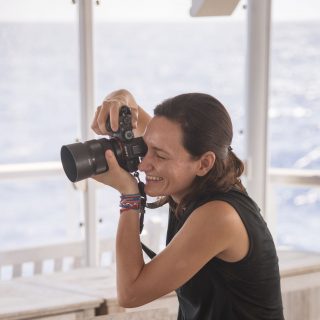R/V Falkor is holding station just seven nautical miles off the coast of Vietnam. On her starboard side, mountains blend into a hypnotising silhouette that is suddenly dominated by a huge gap: the Mekong River mouth. After days of sailing in the open ocean, blue seawater has turned green, announcing our proximity to land. The connection between land and ocean is evident to the naked eye.
Yesterday was World Oceans Day, but onboard every day is ocean’s day: non-stop work to better our understanding of 70% of our planet. We asked some of our crew and scientists to share thoughts we could consider beyond one calendar date.

Ajit Subramaniam: “Take a step back and look at the bigger picture.”
The water cycle is an indivisible system, but we’ve grown accustomed to breaking it into independent pieces. Once we use water, it is very easy for us to forget about it and get on with our day. But water continues its journey, impregnating the entire cycle with any alterations humanity has added to it.
Dr. Subramaniam thinks that when we start considering the entire system, becoming aware of the repercussions of our actions, we will begin to make more efficient use of this precious resource. This means being careful about what we put into the water system and how we dispose of water that has been used. The hope is humans will stop perceiving water as a convenient dumping ground.

Riannon Colton: “Life as you know it exists because of the ocean.”
This is Riannon’s first research expedition. As she moves from one working station to another learning the ropes, she reflects on the extraordinary machine that is the ocean: an array of complex, delicate processes that makes possible the comfortable life we human beings currently enjoy.
Riannon believes that if we were more aware of this, we would manage our waste more effectively, preventing it from entering the ocean. Our relationship would become more holistic, realizing our planet is an ecosystem that relies on the ocean’s health, we would therefore be better stewards of it.

Leighton Rolley: “We are sleepwalking into a disaster.”
Lead Marine Technician Leighton Rolley is passionate about his job and about the ocean. Over his 90+ expeditions he has witnessed things that most of us cannot even imagine, many of them exciting and beautiful, some of them disturbing. Leighton worries that the deep sea is out of sight and therefore out of mind.
We know very little about the world under the waves but one thing we know is the damage that we are inflicting on this fragile environment through plastics, ocean acidification, ambient noise and agricultural run off, to name just a few. For Leighton, things will only improve through education and transparent data collection, sharing the beauty of the deep-sea but also the ugly side of human impact.


Taigh MacManus: “We’re going to have a huge lake on the top of the world.”
As a Canadian and a sailor, the effects of climate change really hit home for Taigh MacManus. As Arctic ice continues to melt, a Northwest navigation passage begins to open, bringing all kinds of territorial, environmental and cultural concerns for his native land. By 2020, Taigh expects the Arctic Sea to be fully navigable.
 Soon it will be easier to transport goods through this more efficient route, and we might not yet be prepared for it. What if there is an accident? The nearest airport is an 8-hour flight away. The Exxon Valdez disaster took place in 1989 and its repercussions are still being felt. Taigh also thinks about oil companies scouting the area: Once the Arctic melts, we could have a huge lake-like structure on the top of our planet, dotted with the lights from rigs like the Gulf of Mexico.
Soon it will be easier to transport goods through this more efficient route, and we might not yet be prepared for it. What if there is an accident? The nearest airport is an 8-hour flight away. The Exxon Valdez disaster took place in 1989 and its repercussions are still being felt. Taigh also thinks about oil companies scouting the area: Once the Arctic melts, we could have a huge lake-like structure on the top of our planet, dotted with the lights from rigs like the Gulf of Mexico.
Interactions with the ocean environment could have consequences that catch us off guard. The Arctic is one example, and Taigh wonders how we can be more responsible and thoughtful, taking all the necessary measures as time passes.

Annalisa Bracco: “Be optimistic.”
We do have very good reasons to be worried, but Annalisa Bracco, Physical Oceanographer, thinks we have the technology and intelligence to turn things around. Annalisa urges nations to strengthen international cooperation and continue investing in research. “When it comes to climate change, for example, people think that since we finally agree that it exists and how it works, we don’t need to study it anymore,” but there is always more to be learned and applied, especially when it comes to the oceans. Annalisa believes we can all come together to change our ways so humans can enjoy a healthy ocean and a healthy planet.
Dr. Joseph Montoya, Chief Scientist, reports that the Mekong Impact team is happy with the results and processes of the expedition so far. And this seems like an excellent way to celebrate this year’s World Oceans Day: increasing our understanding about so we can work towards ways to protect and honor all that the oceans do for us.

